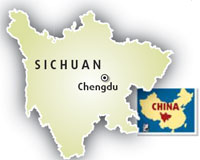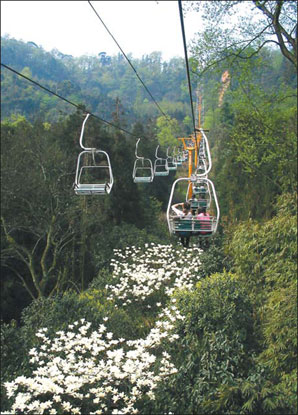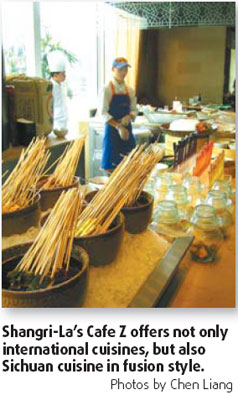 Chengdu, capital of Sichuan province, has long been seen as a haven for people looking for a relaxing retreat. Staying at the Shangri-La Hotel, Chengdu, which opened just last December, I had three days to find out just why.
Chengdu, capital of Sichuan province, has long been seen as a haven for people looking for a relaxing retreat. Staying at the Shangri-La Hotel, Chengdu, which opened just last December, I had three days to find out just why.
It must be the weather, I think at first.
While most parts of southern China were hit by snowstorms and freezing rain this past winter, Chengdu had just one heavy snowfall, offering a rare chance for locals to enjoy the unseasonal snow and sure enough, many flocked to parks to view the spectacular scene.
In fact, some residents of Chengdu think global warming has actually made the city's weather a little nicer: It doesn't rain as often, offering more days of bright sunshine for the locals to take to the outdoors.
The day I arrive in the city is sunny and warm. Though the sky seems a little hazy the next day, it is not because of pollution and petrol fumes as in Beijing, but rather caused by a light drizzle in the night. My nostrils, always a good indicator of air quality, remain clear even after one full day in the city.
The warm weather nurtures the city's colorful vegetation. From my room, I can see the clean Fu and Nan rivers crisscrossing the city. All manner of trees skirt the river banks and the tender new leaves of spring add a touch of refreshing green to the city.
The next morning, I leave the hotel for a walk along the riverbanks. Crossing the bridge that spans Nan River, I turn left and head to Wangjiang Lou or River Viewing Pavilion Park. The park is just 1 km from Shangri-La.
Passing the entrance of Sichuan University, I soon enter a world of lush bamboo. Boasting more than 150 varieties of bamboo from China, Japan and Southeast Asia, the park is a labyrinth created by well-paved pebble lanes trimmed by groves of bamboo, and interspersed with various kinds of flowering trees and vines. As I wander in the park, listening to the chirping of birds, the clamor of the city seem far away.
Later that morning, I head to Qingcheng Mountain, a holy Taoist site some 65 km west of Chengdu. As the car turns onto the expressway from Chengdu to Dujiangyan, fields awash in rape flowers burst upon us. Surrounded by groves of bamboo and blossoming peach trees, they look like yellow carpets covering the Chengdu Plain.
This pleasant scenery stretches all the way to the road leading up to Qingcheng Mountain.
 This UNESCO World Heritage site has numerous Taoist temples en route to the summit at an elevation of 1,600 m above sea level. The climb to the top is a four-hour hike, according to my local guide. When we arrive at the foot of the mountain at noon, the guide tells me that we have a more convenient option to reach the summit - by cable car.
This UNESCO World Heritage site has numerous Taoist temples en route to the summit at an elevation of 1,600 m above sea level. The climb to the top is a four-hour hike, according to my local guide. When we arrive at the foot of the mountain at noon, the guide tells me that we have a more convenient option to reach the summit - by cable car.
Heading into the mountain and climbing up stone slabs, I pass a stretch of beautiful fir forests and several simple, but elegant thatched pavilions, to arrive at Yucheng Lake. To catch the cable car, one has to cross the small lake by ferry as there is no road leading to the cable station.
Not surprisingly, the ferry is packed with visitors who have to pay 10 yuan ($1.4) for a five-minute ride.
The cable-car ride is pleasant and comfortable. Magnolia blooms reaching out to the cable car, give one the feeling of drifting on a sea of flowers. At the end of the cable, one can see colorful rock paintings and carvings.
I get off the cable car at Yuqing Palace, from where I walk up to Shangqing Palace. The temple has several historical buildings and Taoist monks telling visitors their fortune from the lots they draw in the temple.
But what the locals prefer to do is sit down for a cup of tea under a platform shaded by old trees, overlooking the Chengdu Plain.
Their obvious joy is so appealing that I too decide to sit down for my very own cuppa for the next hour.
I visit Du Fu Cottage the next day. This enlarged version of the Tang Dynasty (AD 618-907) poet's original retreat is 20 hectares of dense bamboo groves and vegetation. In mid-spring, colorful flowers can be seen everywhere. After wandering about for an hour, however, I find myself again in a teahouse, ordering a cup of tea.
Again, I am not alone. The teahouse is packed with locals. Mostly elderly people, they chitchat with each other, play cards or mahjong, or just sit there listening to the singing of their caged birds.
I also get to check out the city's rich dining and nightlife. Dinner at Shangri-La's Shang Palace, the hotel group's signature Chinese restaurant, is a rich spread of Sichuan cuisine in fusion style, geared specially to those not adept at handling spicy food.
 My lunch at the foot of Qingcheng Mountain is in a Taoist-style restaurant. It features peaceful Taoist music, organic vegetables from the mountains and distinctive dishes of medicinal value. I find their chicken soup with fresh ginkgo nuts truly unforgettable.
My lunch at the foot of Qingcheng Mountain is in a Taoist-style restaurant. It features peaceful Taoist music, organic vegetables from the mountains and distinctive dishes of medicinal value. I find their chicken soup with fresh ginkgo nuts truly unforgettable.
At the opera-house like flagship restaurant of the Huangcheng Laoma Hotpot chain in downtown Chengdu, I have not only one of the most authentic hotpot experiences in the country, but also enjoy a gala show staged by local artists. Their acts include mask-changing, Sichuan opera and traditional Chinese stringed and woodwind instruments.
As a guest of Shangri-La, I also get a chance to experience the hotel's Chi - The Spa on the last night of my stay in Chengdu.
Inspired by traditional Asian healing philosophies, the spa's treatments are designed to refresh and achieve a balance of the Yin and Yang.
According to the therapist, my "element" is "fire" based on the preferences in taste, colors and daily life that I record on a form.
As I relax under the masseuse's skilful maneuvers in the private spa suite with Tibetan style decoration, I find myself drifting into a state of bliss amid the soft music and aromatic herbs.
But I am soon awakened by the soft ringing of a small copper bell by the therapist, signaling the end of my enchanting Chengdu sojourn.
(China Daily April 17, 2008)